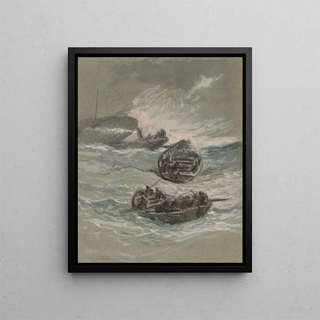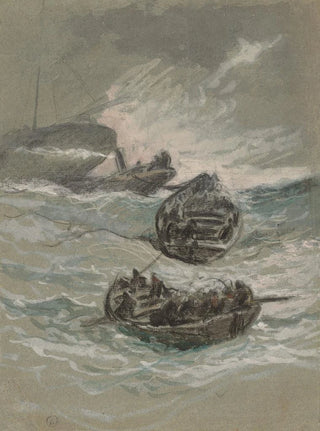Painting The Shipwreck - Elihu Vedder | Art print


View from behind

Frame (optional)
In the rich and complex universe of art, some works manage to capture the collective imagination with rare intensity. "The Shipwreck" by Elihu Vedder is one of those creations that transcend the simple frame of painting to become a true reflection on human destiny. This piece, imbued with mystery and poetry, immerses us in a world where the sea, both nurturing and destructive, becomes the symbol of inner struggles and life's trials. Vedder, through his talent, succeeds in evoking deep emotions through visual elements that engage and invite contemplation.
Style and uniqueness of the work
Elihu Vedder's style is characterized by a unique sensitivity that combines symbolism with an almost mystical approach. In "The Shipwreck," dark colors and tumultuous forms evoke an atmosphere of despair, while hinting at a tragic beauty. The composition is carefully orchestrated, with each element responding in silent dialogue. The human figures, often caught in the storm, embody archetypes of struggle and resilience. This work stands out for its bold use of light and shadow, creating a palpable tension that draws the eye and stimulates the imagination. Vedder manages to transform disaster into an aesthetic experience, where each brushstroke seems charged with meaning and depth.
The artist and his influence
Elihu Vedder, a 19th-century American artist, is often regarded as a precursor of symbolism. His career, marked by travels across Europe, allowed him to absorb the artistic currents of his time while developing a distinctive voice. Influenced by literature and philosophy, Vedder incorporates elements of mythology and spirituality into his works, giving them a universal dimension. "The Shipwreck" exemplifies this quest for meaning, where art becomes a means to explore themes of mortality and existential anxiety. His ability to marry realism with a poetic vision has left an indelible mark on his contemporaries and continues to inspire artists today.

Matte finish

View from behind

Frame (optional)
In the rich and complex universe of art, some works manage to capture the collective imagination with rare intensity. "The Shipwreck" by Elihu Vedder is one of those creations that transcend the simple frame of painting to become a true reflection on human destiny. This piece, imbued with mystery and poetry, immerses us in a world where the sea, both nurturing and destructive, becomes the symbol of inner struggles and life's trials. Vedder, through his talent, succeeds in evoking deep emotions through visual elements that engage and invite contemplation.
Style and uniqueness of the work
Elihu Vedder's style is characterized by a unique sensitivity that combines symbolism with an almost mystical approach. In "The Shipwreck," dark colors and tumultuous forms evoke an atmosphere of despair, while hinting at a tragic beauty. The composition is carefully orchestrated, with each element responding in silent dialogue. The human figures, often caught in the storm, embody archetypes of struggle and resilience. This work stands out for its bold use of light and shadow, creating a palpable tension that draws the eye and stimulates the imagination. Vedder manages to transform disaster into an aesthetic experience, where each brushstroke seems charged with meaning and depth.
The artist and his influence
Elihu Vedder, a 19th-century American artist, is often regarded as a precursor of symbolism. His career, marked by travels across Europe, allowed him to absorb the artistic currents of his time while developing a distinctive voice. Influenced by literature and philosophy, Vedder incorporates elements of mythology and spirituality into his works, giving them a universal dimension. "The Shipwreck" exemplifies this quest for meaning, where art becomes a means to explore themes of mortality and existential anxiety. His ability to marry realism with a poetic vision has left an indelible mark on his contemporaries and continues to inspire artists today.
12,34 €






